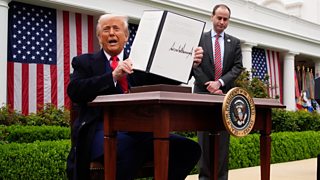
China Urges U.S. to Cancel Reciprocal Tariffs Amid Global Trade Tensions
China has called on the United States to cancel reciprocal tariffs, signaling a potential escalation in the ongoing trade war between the two economic giants. This request comes as a response to the Trump administration's imposition of global tariffs, which have been described as creating an 'all-round blockade' on China. The tariffs, announced recently, have stirred reactions in global markets and prompted discussions about potential retaliatory measures.
The Chinese Ministry of Commerce has expressed concerns over the economic impact of these tariffs, urging the U.S. to reconsider its stance to prevent further strain on international trade relations. Analysts suggest that the tariffs could lead to increased costs for consumers and disrupt supply chains, affecting both countries' economies.
Market reactions have been swift, with investors closely monitoring developments and adjusting their portfolios accordingly. The U.S. decision has also sparked debates among policymakers and economists about the long-term implications of such trade policies. As tensions rise, the international community watches closely, hoping for a resolution that could stabilize global trade dynamics.
Detailed
Related issues news
Does China have tariffs?
China Customs assesses and collects tariffs. Import tariff rates are divided into six categories: general rates, most-favored-nation (MFN) rates, agreement rates, preferential rates, tariff rate quota rates, and provisional rates. As a member of the WTO, imports from the United States are assessed at the MFN rate.
How much are tariffs from China to the USA?
The measure introduces a new 34% tariff on goods from China, on top of an existing 20% levy, bringing total duties to at least 54%. The tariff rate will be 24% on goods from Japan, and 26% from India.




